Sociological Perspectives of the Ministry of Education in Singapore
VerifiedAdded on 2021/04/17
|7
|1425
|47
Report
AI Summary
This report provides a sociological analysis of the Ministry of Education (MOE) in Singapore, focusing on the impact of class, ethnicity, and gender on the education system. It examines MOE's initiatives, such as the opening of new kindergartens and priority admissions, through the lenses of symbolic interactionism and conflict theory. The report discusses how these initiatives aim to bridge educational gaps between different social classes and address concerns from private pre-schools. It highlights the government's plans to expand pre-school places, emphasizing the role of education in social mobility and equality. The report also considers how these initiatives are designed to provide educational opportunities for underprivileged classes. The analysis considers the potential challenges and benefits of these changes within the context of Singapore's diverse society.
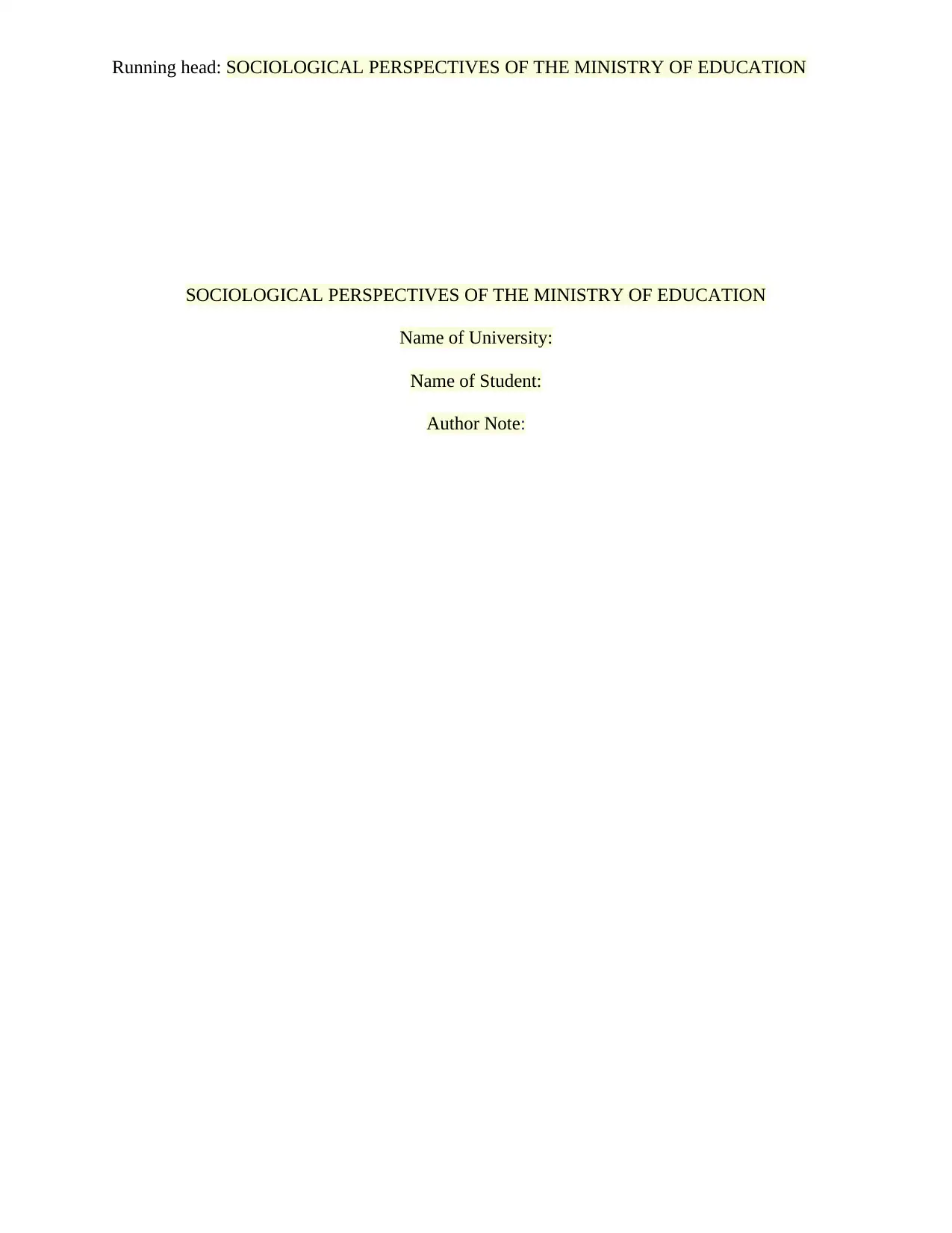
Running head: SOCIOLOGICAL PERSPECTIVES OF THE MINISTRY OF EDUCATION
SOCIOLOGICAL PERSPECTIVES OF THE MINISTRY OF EDUCATION
Name of University:
Name of Student:
Author Note:
SOCIOLOGICAL PERSPECTIVES OF THE MINISTRY OF EDUCATION
Name of University:
Name of Student:
Author Note:
Paraphrase This Document
Need a fresh take? Get an instant paraphrase of this document with our AI Paraphraser
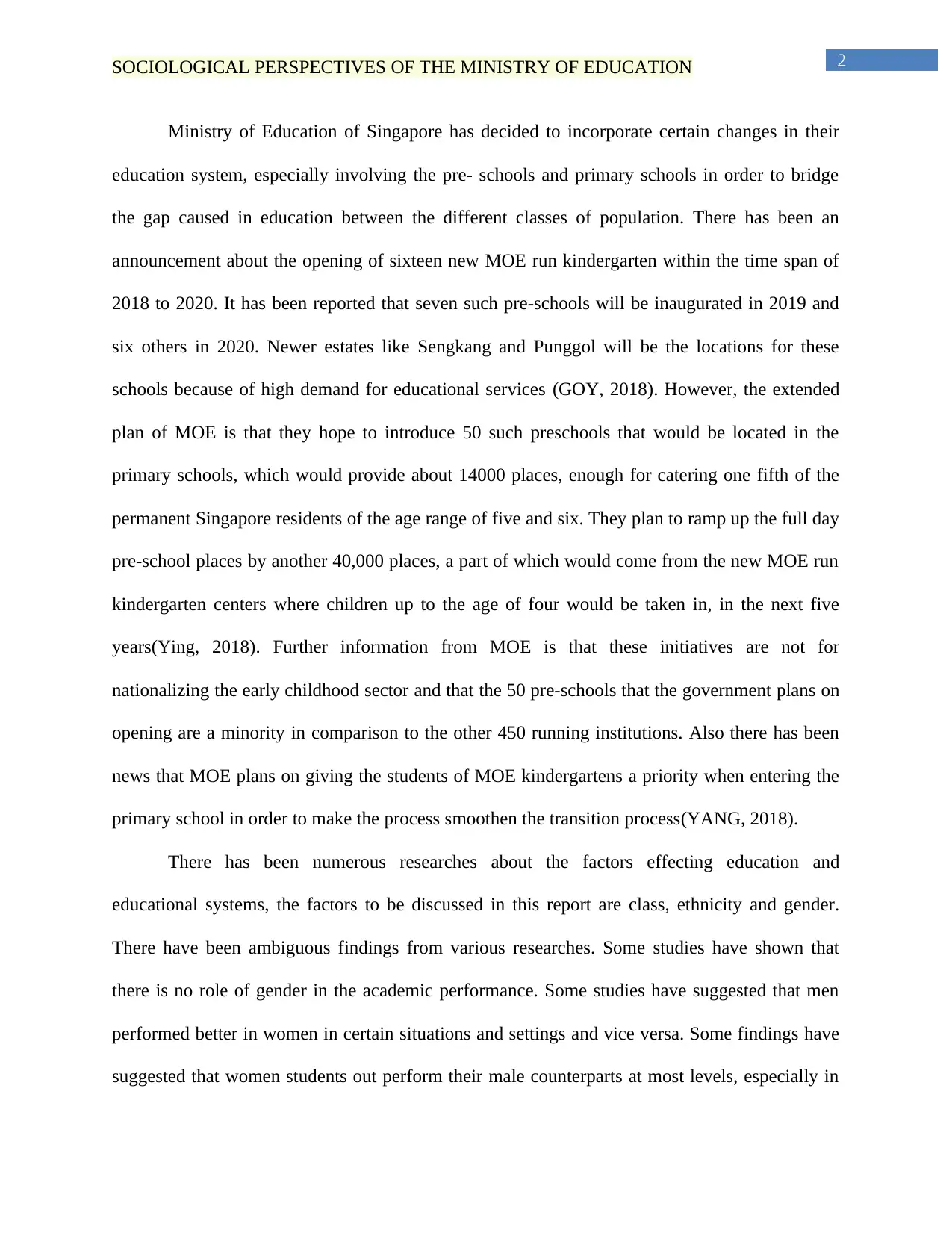
2SOCIOLOGICAL PERSPECTIVES OF THE MINISTRY OF EDUCATION
Ministry of Education of Singapore has decided to incorporate certain changes in their
education system, especially involving the pre- schools and primary schools in order to bridge
the gap caused in education between the different classes of population. There has been an
announcement about the opening of sixteen new MOE run kindergarten within the time span of
2018 to 2020. It has been reported that seven such pre-schools will be inaugurated in 2019 and
six others in 2020. Newer estates like Sengkang and Punggol will be the locations for these
schools because of high demand for educational services (GOY, 2018). However, the extended
plan of MOE is that they hope to introduce 50 such preschools that would be located in the
primary schools, which would provide about 14000 places, enough for catering one fifth of the
permanent Singapore residents of the age range of five and six. They plan to ramp up the full day
pre-school places by another 40,000 places, a part of which would come from the new MOE run
kindergarten centers where children up to the age of four would be taken in, in the next five
years(Ying, 2018). Further information from MOE is that these initiatives are not for
nationalizing the early childhood sector and that the 50 pre-schools that the government plans on
opening are a minority in comparison to the other 450 running institutions. Also there has been
news that MOE plans on giving the students of MOE kindergartens a priority when entering the
primary school in order to make the process smoothen the transition process(YANG, 2018).
There has been numerous researches about the factors effecting education and
educational systems, the factors to be discussed in this report are class, ethnicity and gender.
There have been ambiguous findings from various researches. Some studies have shown that
there is no role of gender in the academic performance. Some studies have suggested that men
performed better in women in certain situations and settings and vice versa. Some findings have
suggested that women students out perform their male counterparts at most levels, especially in
Ministry of Education of Singapore has decided to incorporate certain changes in their
education system, especially involving the pre- schools and primary schools in order to bridge
the gap caused in education between the different classes of population. There has been an
announcement about the opening of sixteen new MOE run kindergarten within the time span of
2018 to 2020. It has been reported that seven such pre-schools will be inaugurated in 2019 and
six others in 2020. Newer estates like Sengkang and Punggol will be the locations for these
schools because of high demand for educational services (GOY, 2018). However, the extended
plan of MOE is that they hope to introduce 50 such preschools that would be located in the
primary schools, which would provide about 14000 places, enough for catering one fifth of the
permanent Singapore residents of the age range of five and six. They plan to ramp up the full day
pre-school places by another 40,000 places, a part of which would come from the new MOE run
kindergarten centers where children up to the age of four would be taken in, in the next five
years(Ying, 2018). Further information from MOE is that these initiatives are not for
nationalizing the early childhood sector and that the 50 pre-schools that the government plans on
opening are a minority in comparison to the other 450 running institutions. Also there has been
news that MOE plans on giving the students of MOE kindergartens a priority when entering the
primary school in order to make the process smoothen the transition process(YANG, 2018).
There has been numerous researches about the factors effecting education and
educational systems, the factors to be discussed in this report are class, ethnicity and gender.
There have been ambiguous findings from various researches. Some studies have shown that
there is no role of gender in the academic performance. Some studies have suggested that men
performed better in women in certain situations and settings and vice versa. Some findings have
suggested that women students out perform their male counterparts at most levels, especially in
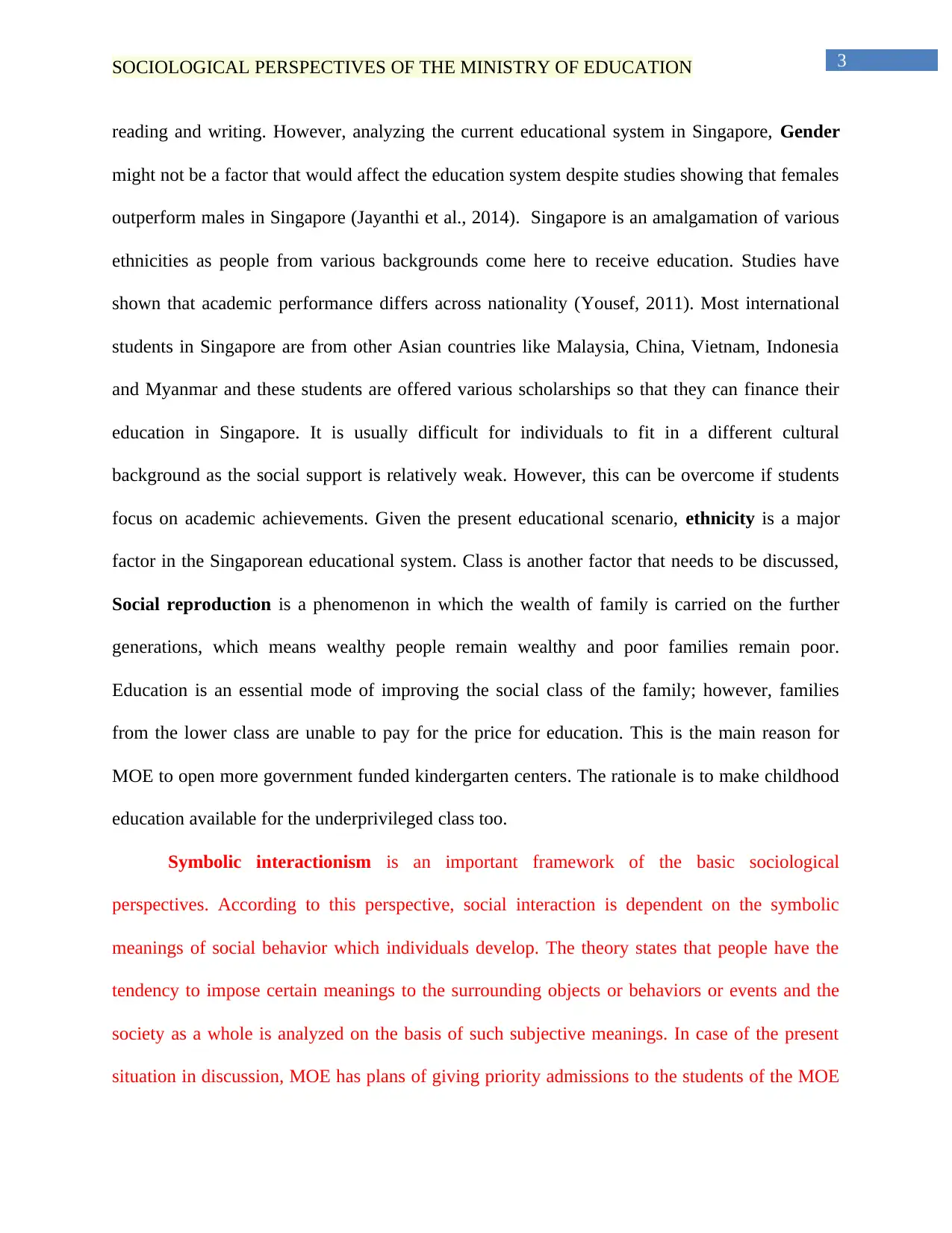
3SOCIOLOGICAL PERSPECTIVES OF THE MINISTRY OF EDUCATION
reading and writing. However, analyzing the current educational system in Singapore, Gender
might not be a factor that would affect the education system despite studies showing that females
outperform males in Singapore (Jayanthi et al., 2014). Singapore is an amalgamation of various
ethnicities as people from various backgrounds come here to receive education. Studies have
shown that academic performance differs across nationality (Yousef, 2011). Most international
students in Singapore are from other Asian countries like Malaysia, China, Vietnam, Indonesia
and Myanmar and these students are offered various scholarships so that they can finance their
education in Singapore. It is usually difficult for individuals to fit in a different cultural
background as the social support is relatively weak. However, this can be overcome if students
focus on academic achievements. Given the present educational scenario, ethnicity is a major
factor in the Singaporean educational system. Class is another factor that needs to be discussed,
Social reproduction is a phenomenon in which the wealth of family is carried on the further
generations, which means wealthy people remain wealthy and poor families remain poor.
Education is an essential mode of improving the social class of the family; however, families
from the lower class are unable to pay for the price for education. This is the main reason for
MOE to open more government funded kindergarten centers. The rationale is to make childhood
education available for the underprivileged class too.
Symbolic interactionism is an important framework of the basic sociological
perspectives. According to this perspective, social interaction is dependent on the symbolic
meanings of social behavior which individuals develop. The theory states that people have the
tendency to impose certain meanings to the surrounding objects or behaviors or events and the
society as a whole is analyzed on the basis of such subjective meanings. In case of the present
situation in discussion, MOE has plans of giving priority admissions to the students of the MOE
reading and writing. However, analyzing the current educational system in Singapore, Gender
might not be a factor that would affect the education system despite studies showing that females
outperform males in Singapore (Jayanthi et al., 2014). Singapore is an amalgamation of various
ethnicities as people from various backgrounds come here to receive education. Studies have
shown that academic performance differs across nationality (Yousef, 2011). Most international
students in Singapore are from other Asian countries like Malaysia, China, Vietnam, Indonesia
and Myanmar and these students are offered various scholarships so that they can finance their
education in Singapore. It is usually difficult for individuals to fit in a different cultural
background as the social support is relatively weak. However, this can be overcome if students
focus on academic achievements. Given the present educational scenario, ethnicity is a major
factor in the Singaporean educational system. Class is another factor that needs to be discussed,
Social reproduction is a phenomenon in which the wealth of family is carried on the further
generations, which means wealthy people remain wealthy and poor families remain poor.
Education is an essential mode of improving the social class of the family; however, families
from the lower class are unable to pay for the price for education. This is the main reason for
MOE to open more government funded kindergarten centers. The rationale is to make childhood
education available for the underprivileged class too.
Symbolic interactionism is an important framework of the basic sociological
perspectives. According to this perspective, social interaction is dependent on the symbolic
meanings of social behavior which individuals develop. The theory states that people have the
tendency to impose certain meanings to the surrounding objects or behaviors or events and the
society as a whole is analyzed on the basis of such subjective meanings. In case of the present
situation in discussion, MOE has plans of giving priority admissions to the students of the MOE
⊘ This is a preview!⊘
Do you want full access?
Subscribe today to unlock all pages.

Trusted by 1+ million students worldwide
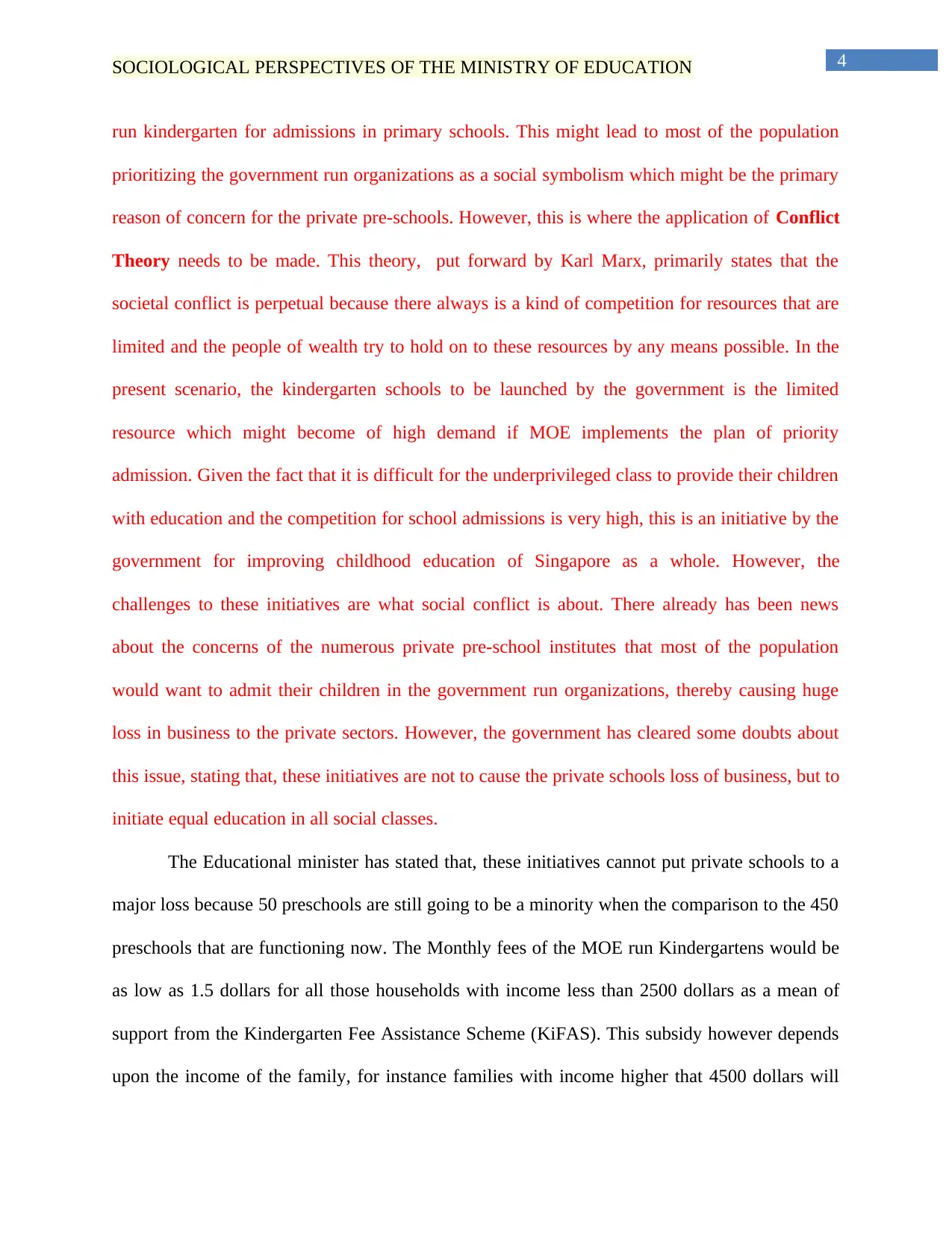
4SOCIOLOGICAL PERSPECTIVES OF THE MINISTRY OF EDUCATION
run kindergarten for admissions in primary schools. This might lead to most of the population
prioritizing the government run organizations as a social symbolism which might be the primary
reason of concern for the private pre-schools. However, this is where the application of Conflict
Theory needs to be made. This theory, put forward by Karl Marx, primarily states that the
societal conflict is perpetual because there always is a kind of competition for resources that are
limited and the people of wealth try to hold on to these resources by any means possible. In the
present scenario, the kindergarten schools to be launched by the government is the limited
resource which might become of high demand if MOE implements the plan of priority
admission. Given the fact that it is difficult for the underprivileged class to provide their children
with education and the competition for school admissions is very high, this is an initiative by the
government for improving childhood education of Singapore as a whole. However, the
challenges to these initiatives are what social conflict is about. There already has been news
about the concerns of the numerous private pre-school institutes that most of the population
would want to admit their children in the government run organizations, thereby causing huge
loss in business to the private sectors. However, the government has cleared some doubts about
this issue, stating that, these initiatives are not to cause the private schools loss of business, but to
initiate equal education in all social classes.
The Educational minister has stated that, these initiatives cannot put private schools to a
major loss because 50 preschools are still going to be a minority when the comparison to the 450
preschools that are functioning now. The Monthly fees of the MOE run Kindergartens would be
as low as 1.5 dollars for all those households with income less than 2500 dollars as a mean of
support from the Kindergarten Fee Assistance Scheme (KiFAS). This subsidy however depends
upon the income of the family, for instance families with income higher that 4500 dollars will
run kindergarten for admissions in primary schools. This might lead to most of the population
prioritizing the government run organizations as a social symbolism which might be the primary
reason of concern for the private pre-schools. However, this is where the application of Conflict
Theory needs to be made. This theory, put forward by Karl Marx, primarily states that the
societal conflict is perpetual because there always is a kind of competition for resources that are
limited and the people of wealth try to hold on to these resources by any means possible. In the
present scenario, the kindergarten schools to be launched by the government is the limited
resource which might become of high demand if MOE implements the plan of priority
admission. Given the fact that it is difficult for the underprivileged class to provide their children
with education and the competition for school admissions is very high, this is an initiative by the
government for improving childhood education of Singapore as a whole. However, the
challenges to these initiatives are what social conflict is about. There already has been news
about the concerns of the numerous private pre-school institutes that most of the population
would want to admit their children in the government run organizations, thereby causing huge
loss in business to the private sectors. However, the government has cleared some doubts about
this issue, stating that, these initiatives are not to cause the private schools loss of business, but to
initiate equal education in all social classes.
The Educational minister has stated that, these initiatives cannot put private schools to a
major loss because 50 preschools are still going to be a minority when the comparison to the 450
preschools that are functioning now. The Monthly fees of the MOE run Kindergartens would be
as low as 1.5 dollars for all those households with income less than 2500 dollars as a mean of
support from the Kindergarten Fee Assistance Scheme (KiFAS). This subsidy however depends
upon the income of the family, for instance families with income higher that 4500 dollars will
Paraphrase This Document
Need a fresh take? Get an instant paraphrase of this document with our AI Paraphraser
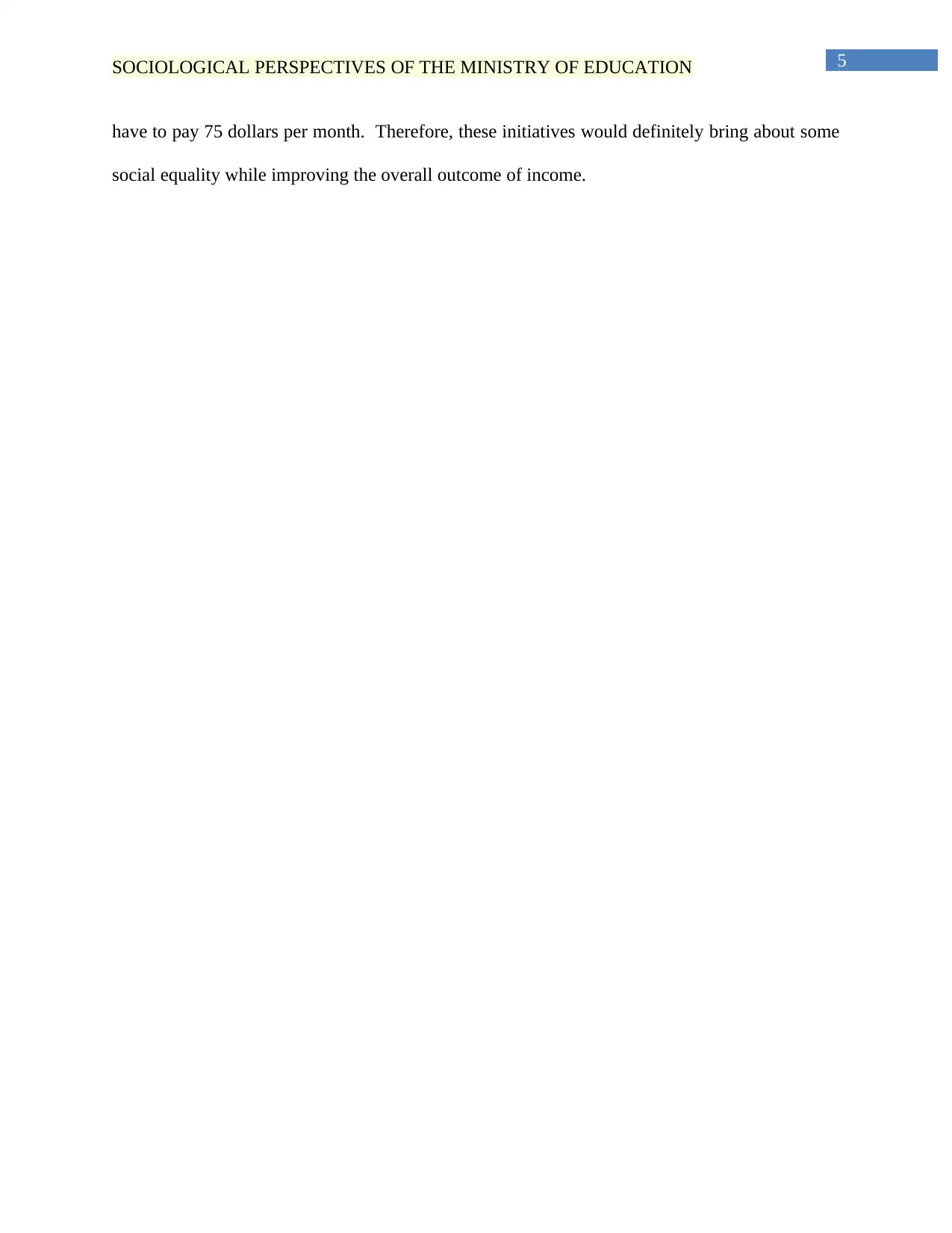
5SOCIOLOGICAL PERSPECTIVES OF THE MINISTRY OF EDUCATION
have to pay 75 dollars per month. Therefore, these initiatives would definitely bring about some
social equality while improving the overall outcome of income.
have to pay 75 dollars per month. Therefore, these initiatives would definitely bring about some
social equality while improving the overall outcome of income.
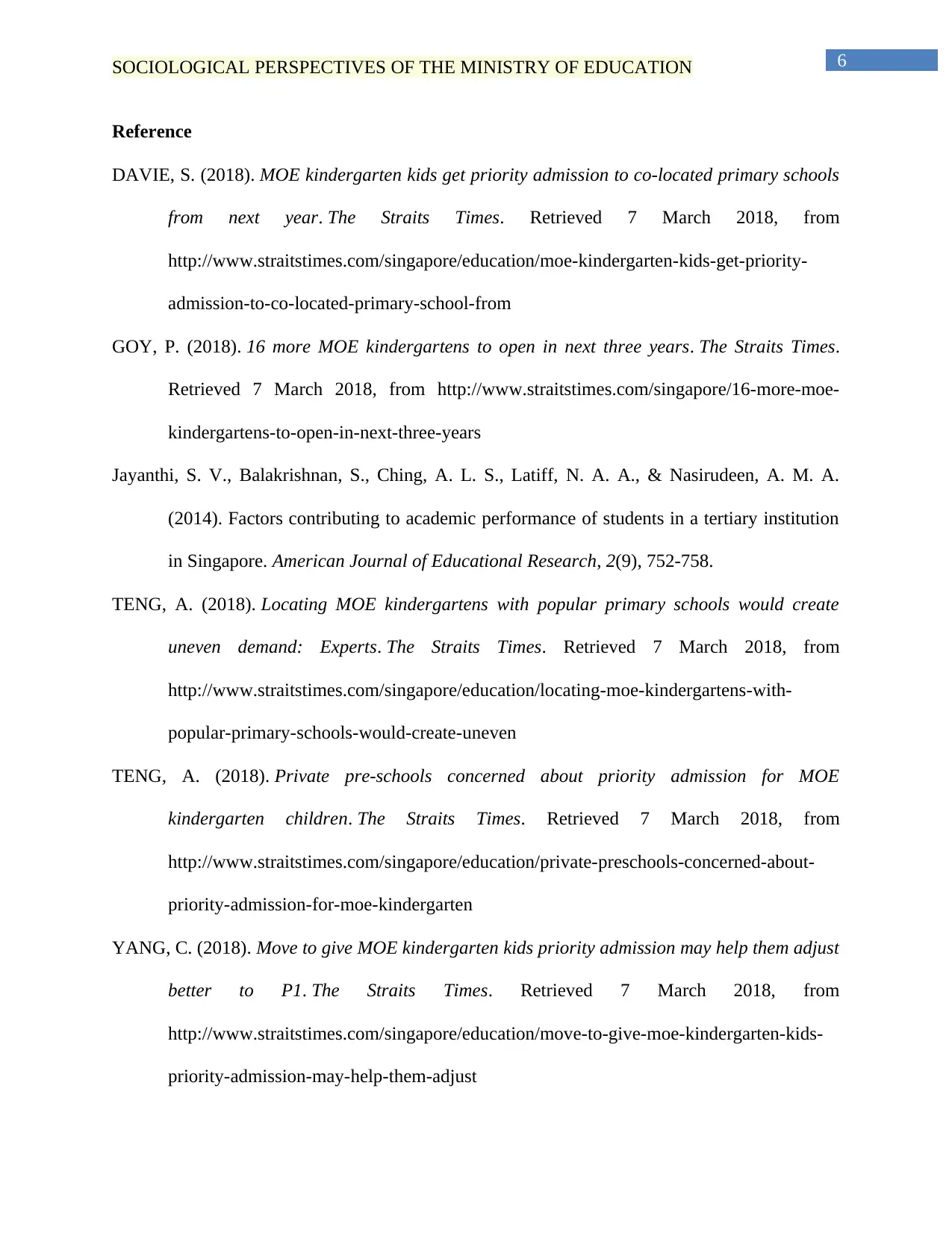
6SOCIOLOGICAL PERSPECTIVES OF THE MINISTRY OF EDUCATION
Reference
DAVIE, S. (2018). MOE kindergarten kids get priority admission to co-located primary schools
from next year. The Straits Times. Retrieved 7 March 2018, from
http://www.straitstimes.com/singapore/education/moe-kindergarten-kids-get-priority-
admission-to-co-located-primary-school-from
GOY, P. (2018). 16 more MOE kindergartens to open in next three years. The Straits Times.
Retrieved 7 March 2018, from http://www.straitstimes.com/singapore/16-more-moe-
kindergartens-to-open-in-next-three-years
Jayanthi, S. V., Balakrishnan, S., Ching, A. L. S., Latiff, N. A. A., & Nasirudeen, A. M. A.
(2014). Factors contributing to academic performance of students in a tertiary institution
in Singapore. American Journal of Educational Research, 2(9), 752-758.
TENG, A. (2018). Locating MOE kindergartens with popular primary schools would create
uneven demand: Experts. The Straits Times. Retrieved 7 March 2018, from
http://www.straitstimes.com/singapore/education/locating-moe-kindergartens-with-
popular-primary-schools-would-create-uneven
TENG, A. (2018). Private pre-schools concerned about priority admission for MOE
kindergarten children. The Straits Times. Retrieved 7 March 2018, from
http://www.straitstimes.com/singapore/education/private-preschools-concerned-about-
priority-admission-for-moe-kindergarten
YANG, C. (2018). Move to give MOE kindergarten kids priority admission may help them adjust
better to P1. The Straits Times. Retrieved 7 March 2018, from
http://www.straitstimes.com/singapore/education/move-to-give-moe-kindergarten-kids-
priority-admission-may-help-them-adjust
Reference
DAVIE, S. (2018). MOE kindergarten kids get priority admission to co-located primary schools
from next year. The Straits Times. Retrieved 7 March 2018, from
http://www.straitstimes.com/singapore/education/moe-kindergarten-kids-get-priority-
admission-to-co-located-primary-school-from
GOY, P. (2018). 16 more MOE kindergartens to open in next three years. The Straits Times.
Retrieved 7 March 2018, from http://www.straitstimes.com/singapore/16-more-moe-
kindergartens-to-open-in-next-three-years
Jayanthi, S. V., Balakrishnan, S., Ching, A. L. S., Latiff, N. A. A., & Nasirudeen, A. M. A.
(2014). Factors contributing to academic performance of students in a tertiary institution
in Singapore. American Journal of Educational Research, 2(9), 752-758.
TENG, A. (2018). Locating MOE kindergartens with popular primary schools would create
uneven demand: Experts. The Straits Times. Retrieved 7 March 2018, from
http://www.straitstimes.com/singapore/education/locating-moe-kindergartens-with-
popular-primary-schools-would-create-uneven
TENG, A. (2018). Private pre-schools concerned about priority admission for MOE
kindergarten children. The Straits Times. Retrieved 7 March 2018, from
http://www.straitstimes.com/singapore/education/private-preschools-concerned-about-
priority-admission-for-moe-kindergarten
YANG, C. (2018). Move to give MOE kindergarten kids priority admission may help them adjust
better to P1. The Straits Times. Retrieved 7 March 2018, from
http://www.straitstimes.com/singapore/education/move-to-give-moe-kindergarten-kids-
priority-admission-may-help-them-adjust
⊘ This is a preview!⊘
Do you want full access?
Subscribe today to unlock all pages.

Trusted by 1+ million students worldwide
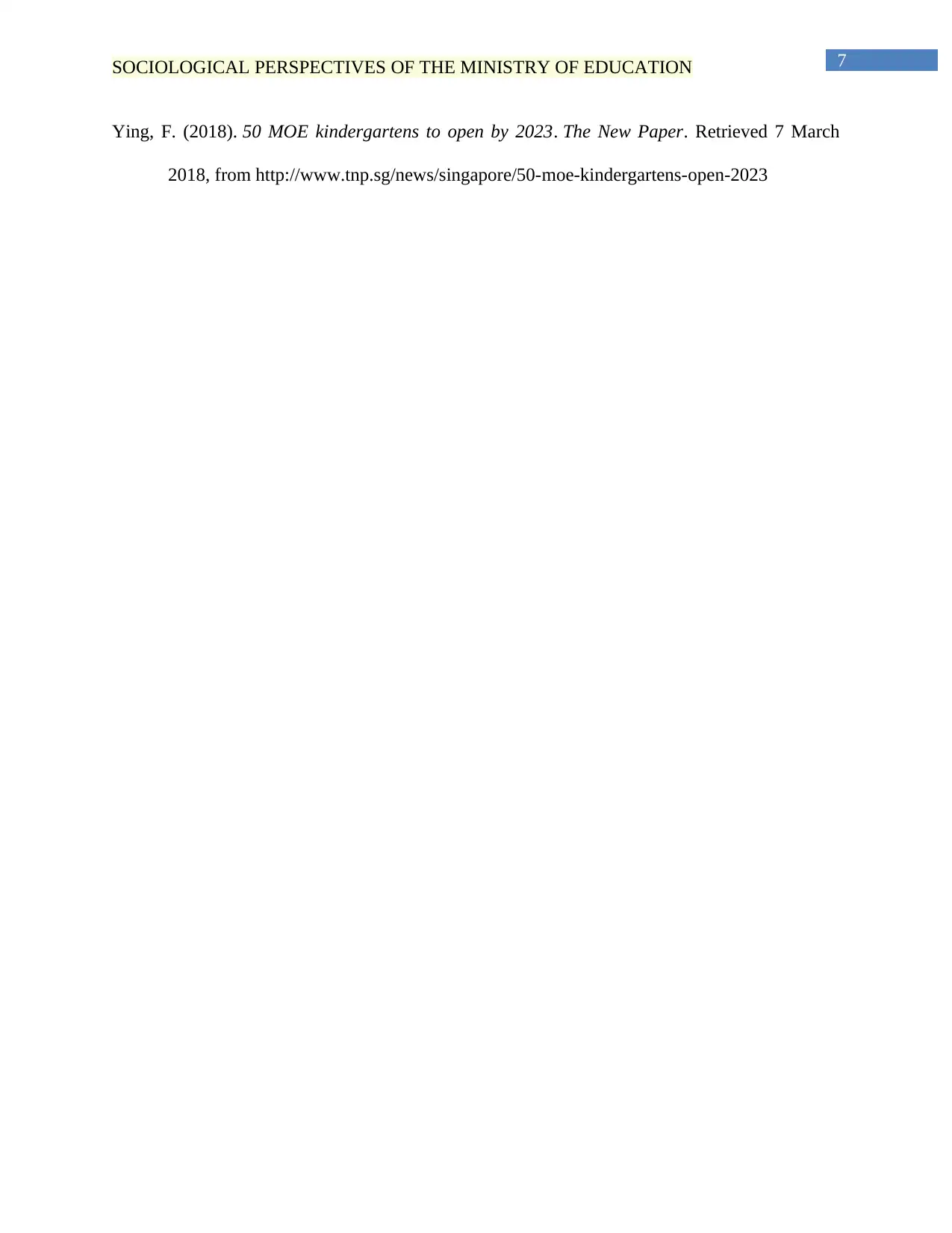
7SOCIOLOGICAL PERSPECTIVES OF THE MINISTRY OF EDUCATION
Ying, F. (2018). 50 MOE kindergartens to open by 2023. The New Paper. Retrieved 7 March
2018, from http://www.tnp.sg/news/singapore/50-moe-kindergartens-open-2023
Ying, F. (2018). 50 MOE kindergartens to open by 2023. The New Paper. Retrieved 7 March
2018, from http://www.tnp.sg/news/singapore/50-moe-kindergartens-open-2023
1 out of 7
Related Documents
Your All-in-One AI-Powered Toolkit for Academic Success.
+13062052269
info@desklib.com
Available 24*7 on WhatsApp / Email
![[object Object]](/_next/static/media/star-bottom.7253800d.svg)
Unlock your academic potential
Copyright © 2020–2026 A2Z Services. All Rights Reserved. Developed and managed by ZUCOL.




